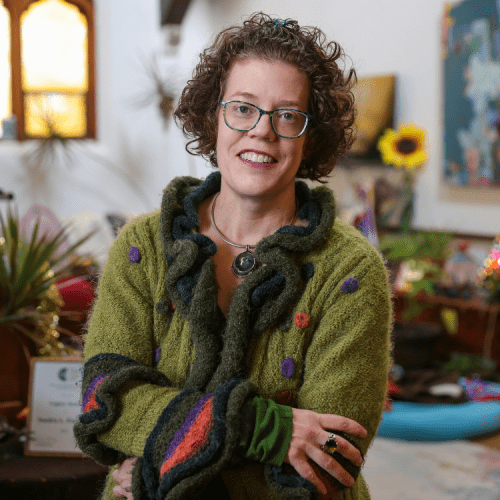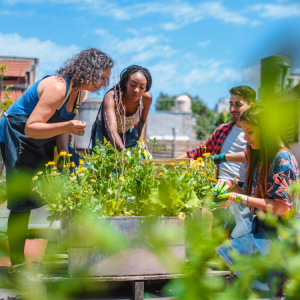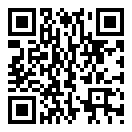CLS: The Common Good
This widget is displayed if cost is set. In order for the widget in this page to be displayed correctly, please set cost for your last event.How to set cost
Stretch, learn, grow and connect. These lectures teach us about building community.
Dr. Rebecca Monteleone
Monday, July 8, 10:30 a.m. | Orchestra Hall
“The Plain Truth Project: Making Inclusive & Accessible News Media with, by, & for People with Intellectual Disabilities”
People with intellectual disabilities have not historically been included in news media created about them nor given consideration as consumers of news. This has created stereotypic representations of disability that cause harm and news products that are not accessible or understandable to the nearly 6.5 million Americans with intellectual disabilities.
Dr. Rebecca Monteleone, along with two self-advocates with intellectual disabilities, Phillis Schmidbauer and Darius Cunningham, will discuss The Plain Truth Project, an initiative they created to bring together journalists and people with intellectual disabilities to make the news more inclusive.
We will discuss current practices that require change and recommendations developed, such as plain language translations, partnerships between journalists and self-advocates, and more. The group believes that all people have the right to information and to participate equally in public conversations; more accessible news is one step toward more just societies.
Rev. John Edgar
Tuesday, July 9, 10:30 a.m. | Orchestra Hall
“A Front Porch for all People, Part 1”
Wednesday, July 10, 10:30 a.m. | Orchestra Hall
“A Front Porch for all People, Part 2”
Rev. John Edgar’s two-day seminar shares the amazing and inspiring story of how a free store and food pantry grew into a congregation that transformed the life of a community, and now provides direct services for over 35,000 people each year.
Rachael Gardner
Wednesday, July 10, 3:30 p.m. | Orchestra Hall
“Why We have to Stop Asking Why Survivors Stay”
Domestic and sexual violence survivors are the only crime survivors who bear responsibility for making the violence stop. The most common question an advocate is asked is, “Why did she stay?” This workshop is designed to take the question from ‘Why does she stay’ to ‘Why don’t they stop’.
Rachael Gardner works as the Director of Victim Services at the YWCA of Northwest Ohio. In this role, she is responsible for ensuring services to domestic and sexual violence survivors are trauma-informed, supportive and loving. She holds a master’s and bachelor’s in social work and is a Licensed Independent Social Worker in the State of Ohio.
Sandra Faulkner
Thursday, July 11, 10:30 a.m. | Orchestra Hall
“Poetic Portraits of Older Women”

It is a useful form for researchers and practitioners interested in a nuanced, critical and evocative re-presentation of interviews. It engages with participants’ stories to challenge dominant ideologies and stereotypes by including marginalized voices and perspectives.
It is a good method for showing researcher reflexivity and can be part of community engaged and participatory research.
In this lecture, Sanda Faulkner discusses the benefits of uses for, and ways to create poetic portraits with examples from a community engaged project with older women’s oral histories about their relationships across the life course.
Thursday, July 11, 3:30 p.m. | Orchestra Hall
“Intergenerational Connections”
In this talk, Faulkner discusses a critically focused, semester-long, community engagement project, entitled “Intergenerational Connections,” in which her students talked with residents at a long-term care facility via Zoom about relationships.
She will share the connections that students made with their dialogue partners that helped break down stereotypes and expectations about interacting with older adults.
The dialogues with older adults allowed students to share their experiences with someone from a different cohort and hear an older adult’s perspectives on topics, such as friendships, family relationships and romantic relationships.
For example, students were pleased to learn that their partners liked some of the same movies they did, and some even liked drinking beer.
What this experience taught Faulkner is the importance of reaching out across generations for meaningful connection, which is something we can all do.
Faulkner is professor of media and communication at Bowling Green State University where she writes, teaches and researches about close relationships. Faulkner’s interests include qualitative methodology, poetic inquiry, inclusive pedagogy and critical perspectives on interpersonal and family communication. She often uses poetry, creative nonfiction and autoethnography to explore her own negotiation of identity as a parent, partner, and professor.
Her research focuses on how individuals navigate gender and sexuality through interpersonal communication and personal narrative and the use of arts-based research as inclusive and critical pedagogy.
Her book, Poetic Inquiry: Craft, Method, & Practice (Routledge), won an Honorable Mention for the 2021 International Congress of Qualitative Inquiry Book Award. Other awards include the 2016 Norman K. Denzin Qualitative Research Award, the 2020 Trujillo and Goodall “It’s a Way of Life Award” in Narrative Ethnography, and the Legacy Award from the National Communication Association Ethnography Division. Find Faulkner online at www.sandrafaulkner.online and bgsu.academia.edu/SandraFaulkner.

